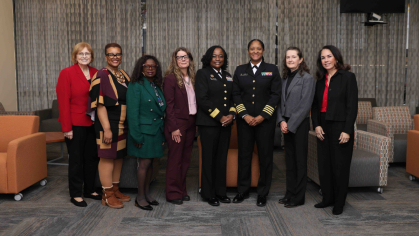Today is World AIDS Day, and December is National HIV/AIDS Awareness Month!
Thank you for your continued support of the Social Work Policy Network!
Professional Opportunities
Fellowships & Internships
Governor's Hispanic Fellows Program - NJ Center for Hispanic Policy, Research and Development
Eagleton Graduate Fellowship Program - Rutgers University Eagleton Institute of Politics
Jobs
Program Coordinator - More Than Food Consulting (remote)
Healthcare Government Relations Officer - New Jersey Innovative Institute (Newark, NJ)
Social Services Supervisor, First Step Program - Coalition for the Homeless (New York, NY)
National Grants Manager - America Votes (Washington, DC)
Policy Manager - National Partnership for New Americans (Washington, DC)
Manager, People Development - Ironbound Community Corporation of (Newark, NJ)
Executive Director - Wafa House, Inc. (Fair Lawn, NJ)
Chapter Organizer - Lift Every Voice Philly (LEV) (Philadelphia, PA)
Spring Courses for your Consideration!
Poverty, Inequality, Discrimination & Public Policy (19:910:544)
offered by the School of Social Work
Wednesdays, online, 6-9pm
"Confronting issues of poverty and inequality is a core value of the social work profession. This course will provide students with a theoretical, empirical, and analytical understanding of poverty and inequality in the US. Throughout the course comparisons will be made with other developed nations."
Prerequisite: Human Behavior and the Social Environment
LGBTQIA+ Policy (34:833:687:01)
offered by the Edward J. Bloustein School of Planning and Public Policy
Mondays, Civic Square Building, 12:10-3:10pm
"For years, LGBTQIA+ individuals have fought at the ballot box, through rallies and protests, in government, and in the courts for lived equality under the law. The LGBTQIA+ community has had a long history of political movements that have helped to shape and hinder public policy regarding healthcare, education, employment, etc. This year alone, the LGBTQIA+ community has faced over 500 anti-LGBTQIA+ bills across the country, which has been the result of LGBTQIA+ issues becoming prominent in mainstream political debates and agendas. This interactive course will explore the history of LGBTQIA+ political movements, its impact on public policy, how intersecting identities correlate to public strategy, and how the media has affected the movement. What is the current political climate as it pertains to LGBTQ+ issues across the country? How has the anti-LGBTQIA+ movement impacted New Jersey state legislation, policy, and local politics?"
Upcoming Events
Substance Use Disorder Program Availability in Safety-Net and Non–Safety-Net Hospitals in the US
with Ji Eun Chang, PhD
Sponsored by the NJ ACTS Special Populations Core 2023 Seminar Series
Tuesday, December 5, 2023, 12:00 p.m.
Hospitals are ideal sites for delivering addiction treatment to patients with substance use disorders (SUDs), but the availability of these services varies nationwide.
Ji Eun Chang, Ph.D., Assistant Professor in the Department of Public Health Policy and Management at the New York University School of Global Public Health, will present work examining differences in the delivery of different SUD programs across U.S. hospitals, with a particular focus on safety net hospitals. Presented by NJ ACTS Special Populations Core 2023 Seminar Series, Center for Health Services Research, Rutgers Institute for Health, Health Care Policy and Aging Research.
Nurture Connection Presents: Early Relational Health (ERH) Research, Principles, and Perspectives
Presented by The Center for the Study of Social Policy
Thursday, December 7, 2023, 12:30pm - 1:45pm
In their new report, Early Relational Health: A Review of Research Principles and Perspectives, lead authors Dr. Junlei Li and Thelma Ramirez from the Harvard University Graduate School of Education explore the science and practical applications of Early Relational Health, presenting a valuable resource for practitioners working to advance the health and well-being of children and families.
Learn the science behind how ERH connects with principles for actions for parents, caregivers, practitioners, and policymakers based on the Burke Foundation's new report. Speakers include Usha Ramachandran, Junlei Li, Kay Johnson, Monique Fountain Hanna, and LaVonia Abavana.
The objective of this study was “[t]o analyze relationships between Medicaid automatic enrollment for child Supplemental Security Income (SSI) recipients and health insurance coverage during transitions.”
Senators Debate Whether Gun Violence In US Is A Public Health Emergency - KFF Health News (links to several articles)
“The U.S. Senate Judiciary Committee heard from health care professionals on the frontlines of the gun crisis during a hearing Tuesday. Democrats on the panel argued that violence levels should be considered a public health emergency.”
5 issues to watch at this year’s global climate conference - The Hill
“[O]n Thursday, world leaders, climate negotiators, activists, corporations and lobbyists gather[ed] in Dubai for the COP28 global climate summit. The annual United Nations conference serves both as a forum for nations to highlight progress and make announcements in the fight against climate change and as the stage for formal negotiations for global agreements on key climate issues.”
Free COVID tests headed to nation's schools - NPR
“Schools across the U.S. will soon be able to order free rapid COVID-19 tests from the federal government. The administration's initiative will make available millions of tests for school districts as they enter the winter months — a time when COVID activity is expected to peak. Already, emergency department visits and wastewater data indicate that cases are climbing in the U.S.”
Local & Regional Updates
N.J. Supreme Court weighs time restrictions on sex assault and DNA cases - NJ Monitor
“DNA evidence brought a recent break in the long-unsolved 1990 rape and murder of a young woman in Wildwood, but now a court battle over timing could keep prosecutors from trying the Millville man authorities arrested for her sexual assault…The high court now must decide whether to uphold the appellate dismissal, or to reinstate Rosado’s case under legislative amendments enacted since victim Susan Negersmith’s death that expanded New Jersey’s statutes of limitations on sexual assaults and crimes with DNA evidence.”
Overdose reversal training for college students, faculty - New Jersey Spotlight News
“Students, faculty and community members attended a Montclair State University training this week, where they learned how to administer the opioid overdose reversal drug naloxone, also known as Narcan. They were taught to look for telltale signs of an overdose being caused by opioids.”
Here’s why Gov. Murphy vetoed bill to steer nonviolent offenders from courts to counseling - NorthJersey.com
“Gov. Phil Murphy has vetoed legislation that would steer certain nonviolent offenders away from the state criminal justice system and into mental health programs. But he indicated he would be willing to support the initiative if lawmakers limit the offenses covered. The Democrat on Tuesday announced he had issued a conditional veto of the bill, S-524, which passed both the state Senate and Assembly in June.”
RWJ spends $120 million on replacement nurses as strike approaches fifth month - mycentraljersey.com
“Striking nurses at Robert Wood Johnson University Hospital in New Brunswick are awaiting a response on their latest contract proposal submitted last week, according to a union spokesperson…The hospital…has paid more than $120 million for replacement nurses with the highest levels of certification and experience in acute care and specialized clinical areas, according to the hospital's community webpage.”
Highlight of the Week: World AIDS Day 35
"Remember and Commit"
From HIV.gov:
Every year on December 1st, the world unites to commemorate World AIDS Day. This annual event serves as a reminder of the global struggle to end HIV-related stigma, an opportunity to honor those we have lost, and a rallying cry to continue working toward a day when HIV is no longer a public health threat. In 2023, we mark the 35th commemoration of this important day with the theme “World AIDS Day 35: Remember and Commit”.
This year’s theme, “World AIDS Day 35: Remember and Commit,” pays tribute to those we have lost to HIV/AIDS. The impact of this epidemic has been profound, affecting individuals, families, and entire communities across the globe. Remembering the lives lost not only honors their memory but also emphasizes the urgency of our commitment to end the HIV epidemic.
The other aspect of this year’s theme, “Commit,” emphasizes our collective responsibility to act. Each one of us can make a difference, whether through working to improve health equity and ending the disparities in access to prevention, care, and treatment; promoting scientific education and awareness; or supporting organizations that work tirelessly to serve those at risk and living with HIV—we need a whole of society response to win.
--
Here are some facts, policies, and activities you can take a look at in acknowledgement of World AIDS Day:
Facts from the World Health Organization
HIV remains a major global public health issue, having claimed 40.4 million [32.9–51.3 million] lives so far with ongoing transmission in all countries globally; with some countries reporting increasing trends in new infections when previously on the decline.
In 2022, 630 000 [480 000–880 000] people died from HIV-related causes and 1.3 million [1.0–1.7 million] people acquired HIV.
Facts from HIV.gov
HIV diagnoses are not evenly distributed across states and regions. The highest rates of new diagnoses continue to occur in the South.
People aged 13 to 34 accounted for 58% (18,700) of the estimated 32,100 new HIV infections in 2021.
From 2015 to 2019, the rate of new HIV infections among Black women is 11 times that of white women and four times that of Latina women.
U.S. Policies
The White Office of National AIDS Policy implemented the National HIV/AIDS Strategy, which "sets bold targets for ending the HIV epidemic in the United States by 2030, including a 75% reduction in new HIV infections by 2025 and a 90% reduction by 2030" (HIV.gov). Review the Initiative here.
The CDC highlights several policy issues that impact HIV transmission and reduction: housing, self-testing, transgender communities, and more. Visit the CDC to review the briefs here.
Activities
Wear a red ribbon in observance of World AIDS Day (and every day)! The red ribbon became a symbol of HIV/AIDS awareness in 1991 by the Visual AIDS Artists Caucus in New York.
Make a panel for the AIDS quilt. The AIDS quilt began being assembled in 1985, and was first displayed in 1987 on the National Mall in Washington, DC. Information and tips for making a panel can be found here, and further reading on the activist history of the Quilt can be found here.
Get tested! Find your local rapid-testing center here.



